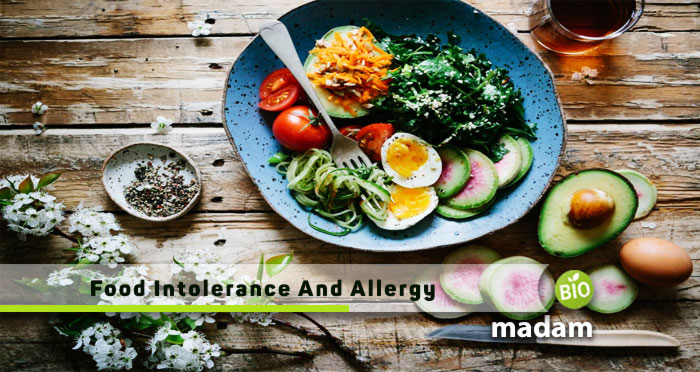Food intolerances and allergies are often confused. Despite their differences, both can make living one’s life extremely difficult, particularly if one is sensitive or allergic to an ingredient that’s commonly included in processed food, or cooked meals, like food preservatives, onions, or garlic.
If you suspect that you have got an intolerance or allergy, it’s important that you contact a medical professional and undergo official testing. Food intolerances, despite being uncomfortable, are harmless. Allergies on the other hand are fatal. You need to identify which you are suffering from.
This article will now break down both food intolerances and allergies, explaining the differences between them:

Food Allergies – How are they Diagnosed?
Food allergies are diagnosed, usually, by prick tests. There are other tests available, also. Experts recommend to do a food allergy test privately because they are often more detailed than those performed by doctors, who are overworked due to the pandemic. In addition to tests, if you have a bad reaction to a specific food, then you can safely surmise that you are allergic to it. It is worth getting a doctor’s opinion also, even if it is evident that you are allergic to a specific food item.
What are the Symptoms of Food Allergies?
The symptoms of food allergies differ from person to person. Symptoms also vary in severity. People with severe allergies are more likely to experience anaphylactic shock than people with minor allergies, for example. Some of the most common symptoms of food allergies include:
- Tingling or itching in the mouth after one has consumed an allergen.
- Hives, eczema, or itching appear after eating.
- Swelling of one’s face, lips, or tongue are very serious symptoms that require immediate medical treatment.
- Wheezing, congestion, and breathing issues, are also symptoms that require medical attention.
- Diarrhoea, vomiting, nausea, and abdominal cramps.
- Light-headedness, fainting, and dizziness.
How are Food Allergies Treated?
The main treatment for food allergies is total abstinence from the food product that causes one’s allergies. If you are eating out, then you need to tell the restaurant or bar about your allergies so that they can make food for you that has not been in contact, with or contains, the ingredients that you are allergic to. You must also carefully read all ingredients of any products that you buy for your home so that they do not contain allergens.
In terms of immediate treatment, two options are available. If you are having a very minor reaction, then you can take an over-the-counter antihistamine. If you are having more serious symptoms, then you need to go to a hospital’s ER immediately. You may even need to call an ambulance if your symptoms are particularly severe.
It is entirely possible for an allergic reaction to turn fatal. For this reason, worrying symptoms should not be treated at home, and instead, should be addressed by visiting a hospital. Hospital staff will be able to quickly administer medication, reversing one’s allergic reaction.

Food Intolerances – How are they Diagnosed?
Food intolerances, like allergies, are diagnosed by having a test performed. Fortunately, food intolerances are not fatal and cannot take one’s life. Unfortunately, this means that it can be hard to determine whether one is suffering from food intolerance or not. The symptoms of food intolerances are similar to that of food poisoning and other conditions. It is very important that you get your intolerances diagnosed so that you can develop a treatment plan. A food intolerance test will tell you every type of food that your body is intolerant to.
Common Food Intolerances
- Histamines are naturally occurring chemicals in food like bananas, chocolate, and avocados. People that have histamine intolerances cannot break down the chemical, which leads to them having bad reactions.
- Gluten intolerance is another very common food intolerance. Gluten is a protein that is found in barley, rye, and wheat.
- Lactose intolerance is very common. People who are lactose intolerant cannot produce lactase enzymes, which breaks down lactose, a sugar that is found in dairy products.
How are Food Intolerances Treated?
There is unfortunately no treatment for food intolerances. The only treatment is prevention, through total abstinence. You need to make sure that if you are suffering from food intolerance, that, like with allergies, you read the ingredients contained within any products that you are buying, or meals that you are eating when you eat out. Food intolerances can be managed successfully if you abstain from eating trigger foods.
Differences Between Food Intolerances and Allergies
As this article shows, there are many differences between allergies and intolerances. Some of the most common include the fact that food intolerances only affect your stomach and intestine of the digestive system and occur when your digestive system can’t break down certain foods, while allergies are a reaction of one’s immune system, and occur when one’s immune system mistakes protein for threats. Other differences are:
Food Intolerances:
- Cause symptoms like upset stomachs, gas, and abdominal pain, but aren’t life-threatening in any way.
- Symptoms manifest a few hours after eating, as food processes through one’s digestive system.
- Symptoms may not show up if small amounts of food are eaten.
Food Allergies:
- Cause an allergic reaction, that result in very serious symptoms, including swelling of one’s face and tongue, hives, and shortness of breath.
- Symptoms appear within minutes of consuming even a small amount of food that one is allergic to.
- Can cause a life-threatening reaction called anaphylaxis, which, without epinephrine treatment, can be fatal.
If you experience negative symptoms after eating specific foods, you should keep a log of your symptoms, and the foods that you have eaten. By doing so, you will be able to identify foods – or ingredients – that you are allergic to. A very common insensitivity is to food preservatives, colourings, and sweeteners. If you notice that you only experience negative symptoms after eating processed foods, then this could be the cause. Many people are also allergic to these ingredients.
If you are suffering from what you suspect is an intolerance or allergic reaction, then you need to get tested immediately. If it turns out to be an allergy, then you could be risking your health by not getting checked out and treated. Tests are cheap, quick, and very effective.

Hi, they call me Jenna, and I am also known for achieving a gold medal during my Ph.D. in science life. I always had a dream to educate people through my utmost writing hobby. So, I chose this blogging path, and Biomadam gave me this opportunity to present for them. I now stand to entertain you. Continue reading my articles & discuss if you’ve any confusion through the comment section below.

